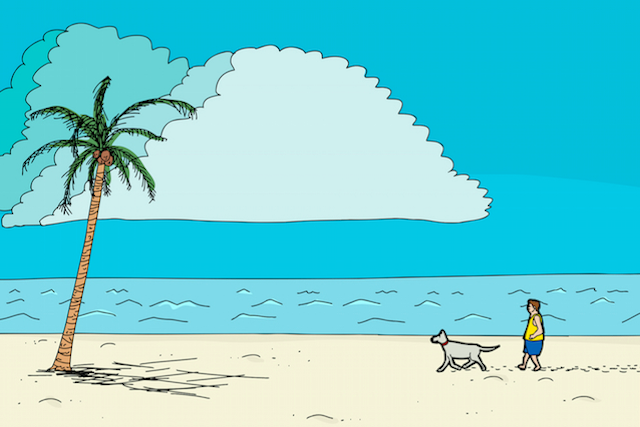
“Be who you want to be, not what others want to see.” ~Unknown
Growing up in a consumer society has its obvious advantages—technology is abundant, restaurants are everywhere your eyes can see, and grocery store shelves are always full. All of this leads to the illusion that everything is available, in quantity, all of the time, and for the most part it is.
I was born and raised in a consumer culture and I thought I had it all; the ability to buy whatever I wanted and needed was deeply ingrained in my psyche. In my childhood I had toys, stuffed animals to decorate my bed, Nintendo, a swimming pool in the backyard, a unicycle, my own little black and white portable TV, and a closet full of shoes.
My tastes changed over time, but until I became an adult at the age of twenty-eight my perception about shopping and acquiring stuff was on the naive end of the spectrum.
It didn’t matter where things came from, so long as they came and there was a temporary happiness associated with each and every purchase.
Change. Something must change. I heard whispers in the night.
The things I had accumulated were not bringing joy; what was more, they weren’t even being worn or used. I thought about the excess, my excess, others’ excess, the excess from stores that never gets sold and has to go somewhere, then I considered for a moment the environment.
My husband and I moved from a one bedroom apartment in Seattle to the plains of southeastern Hungary to immerse ourselves in quiet country life.
We had a strong desire to get away from the hustle and bustle of city life. We purchased a five hectare farm with cob buildings, built without foundations and just silt under the tile floors. Electricity, but no running water.
It was ours—the trials, the warmth of the fireplace, the peace and quiet to reflect on life.
After five years of spending mornings in silence, listening to the sounds of pheasants, guinea, and owls, our closeness to nature started to become rapidly apparent. Simplicity crept into our lives as an inkling of an answer of previously soft-spoken whispers.
Drawing water from the well, bucket by bucket, spinning wool, and preserving fruit, the introduction of self-reliance into our lives was profoundly exciting and exhilarating at the same time.
Paring down and wising up, we slowly became eco-minimalists.
There are downsides to being “different”: We have lost friends along the way, our parents don’t quite understand our determined stance on living a simple life, and it isn’t easy being green. So, is living an unconventional simple life worth it? By all means, yes!
The rewards are beautiful when you truly accept gratitude into your heart. Gratitude for the little things in life: the meaningful conversations, the love, the laughter, the roof over your head (never to be taken for granted), the ability to cook for yourself and sew your own clothes.
How do you know if you are suited for a different kind of simple living? You are ready to live life on your own terms, for your own pursuit of happiness.
Distancing yourself from society may be necessary to get out of the brain smog, so that you have the ability to think for yourself without the white noises of traffic, bells, and life on the street. Spending time in silence does wonders for restoring the soul and giving you time to emerge into a new persona, a more intelligent version of your former self.
1. When memories become the real worth in your life, not things.
Think about your past, your childhood. What memories stand out? The number of toys you owned or the family and friends that you shared those special toys with? That you got to go hiking in a canyon or shopping in a cityscape?
Chances are good that it was the experiences that made life enjoyable, not the stuff—the people that you remember, the good times and the bad, the memories that last a lifetime.
2. When connecting with nature is a desire, not a chore.
Getting outside for fresh air daily is not only good for your lungs, it may help to simplify your life. It gives you the opportunity to walk, ride a bike, and move your limbs, a natural way to keep fit.
Connect with the earth by walking barefoot, laying in the grass, looking up at the sky and by allowing yourself to feel small in the vast universe.
3. When you are tired of the chase.
A life lived slowly is a life well lived. When we rush we miss expressions, we miss flowers in bloom, and we miss moments that will fly right by. Slow down!
Life is not a race. There is no competition; there is no need to whiz by. There is however a need to enjoy the details, to smile at the clouds and have the ability to wait. Patience is an esteemed virtue that we can all strive for.
4. Interest-led learning excites you!
Simple living is all about self-reliance. The ability to learn things on your own shows your determination, flexibility, and open-mindedness. When you learn new things out of your own interest, you are sure to embrace new ideas and take them far.
We didn’t become the architects and engineers our family and friends wished us to be, we didn’t even become who we thought we would be. Instead, we became us—and we are extremely joyous and grateful for that.
Wherever you go, be the change you would like to see in the world.
You don’t need to change addresses or move mountains to discover simplicity. You don’t even need to travel. You can find it right in your own home. Create new memories, go for a walk and connect with nature, explore self-reliance and be open to taking your new life in, slowly.
About Cheryl Magyar
Cheryl Magyar is a freelance writer, tree planter, and sustainable life designer, homesteading in the hills of northern Romania. Embrace nature and head over to ForestCreekMeadows for more insights of living a simple life! Follow on Instagram, and download My Sustainable Year, a monthly guide to inspire everyday actions of sustainability, as you sign up for their newsletter.












 Though I run this site, it is not mine. It's ours. It's not about me. It's about us. Your stories and your wisdom are just as meaningful as mine.
Though I run this site, it is not mine. It's ours. It's not about me. It's about us. Your stories and your wisdom are just as meaningful as mine.
Another beautiful article I stumbled upon today; it can be so hard to detach yourself from the expectations others have of you – so thank you for inspiring and encouraging me to move in the right direction – that is, my own personal direction.
People flourish when they are able to be passionate about their interests and a more meaningful life usually follows suit. It isn’t about being stubborn or without compassion, it is about allowing yourself the life that is rightly yours, the ups and downs, the love and the pain, the chance to define your own being.
A very refreshing post….especially the last part, we don’t need to completely remove ourselves in order to live a simple, meaningful, mindful experience. Thank you.
Instead of memories, maybe present moment experiences could be number one as well !
What do you think?
We believe you can live simply anywhere in the world, like many aspects of life – it all depends on your state of mind. The more you open your life to experiences, the less stuff you need for entertainment.
You are right, being fully present in the here and now is so important. Don’t let nostalgia clutter your mind, but always remember there are lessons to be learned from the past, all the while keeping in mind the health of the future. Life is beautifully complex like that.
Each point resonates with me.
I remember as a kid I didn’t really care to be outside so much, but now I love simple things like just enjoy the environment. I don’t even have to be doing anything in particular.
~Lea
Interesting. Not sure I’d be ready to go the whole self sufficient living any more, though once I liked the idea. I think I wouldn’t have the energy any more. But, more realistically, any tips on living minimally with a partner who couldn’t give a toss about living that way, and who has childhood issues with being without, and sees having ‘stuff’ around as a sign of security and ‘providerliness’ ?
Enjoy this post! I struggle with so much of the American dream I was raised to believe, already do what I can to live against the norm, but have not yet simplified nearly enough for my dreams. My excuse has been raising a child single-handedly makes me want to spend every waking hour doing a mind-numbing job rather than take risks, learn how to build a tiny 200 sq ft house in the woods, grow my own food, and live there. As Thich Nhat Hanh says, “The American dream is no longer even possible for the Americans. . . [and] other developing countries are are still dreaming the ‘American dream,’ as if that dream were the ultimate goal of mankind– everyone has to have a car, a bank account, a cell phone, a TV set of their own.”
Hello,
this article remind me of a great Teacher Thich Nhat Hahn,a great zen master.
He always emphasized to slow a watching the blue sky or flowers to bring happiness when sad.
I just invide those beings as Cheryl that get the luck to find it out.
Peace and love,thats everything we need
Well,a food a bit as well and water
Any moments spent outside, even if only for a brisk walk in the cold dew can really brighten the darkest day, the beauty of nature!
Beautiful post. My family is in the process of simplifying our lives – nothing as extensive as no running water – but still making life more meaningful.
The no running water isn’t a permanent feature 🙂 but it has provided us with so many valuable lessons. Explore all the wonderful moments while simplifying your lives!
The ability to find “enough” is different for each and every one of us. Twenty years ago I would have never given a second thought about a minimalist life, now it is second nature.
My husband and I share a very basic cell phone that doesn’t even take pictures (we use it more like a land line taking it with us only when we expect an important call), we don’t own a car – just two bicycles and the television is eight years out of our lives. On the upside we have much more time to spend with each other and we have learned so many things along the way, some out of necessity, more out of interest. When you are truly ready, simple living will sweep you off your feet, patience is key.
Joshua Becker at Becoming Minimalist might have plenty to say about that. As far as being self-sufficient – that is not something that we strive for, rather we are interested in a form of self-reliance, that we know how to and can take care of ourselves whatever the weather or financial situation at the moment.
I think it is absolutely beautiful what you are doing and more people should think about how blessed or maybe not we are… Who says that having running water or constant electricity is something good?! I have experienced both sides and living without the things that we take for grated on a daily basis is really a blessing.It brought me closer to myself and made me appreciate even the smallest things at home. All has it’s advantage and disadvantage it just depends on how we see it. Also I feel happy for you that you have been able to find a partner who shares the same ideas as yours 🙂 All the best for you all!
Thanks a lot for sharing this and I was amazed to see the facts in this post that I’ve been already thinking of. The truth is our teachers, parents and everyone force us to run.. run.. and run faster. But the truth is, the real happiness and the victory come life when we stop running.
Great read. Thank you!
thank you for sharing the idea of living simple…..have a nice day..
i want to ask a question…. how can i live simple if the world are getting too complicated to live?….. Specially to those who are striving and dying just because of not enough food and shelter….. specially those corrupt person who are enjoying the money they steal for those people instead…. So please tell me?……
very good article… thank you for sharing your idea of living life in simpliciy way…
The longer I live in the city, the more I want to live away from it. A country side somewhere in Thailand is where I’m going to unplug. Thanks for the post, I enjoyed it 🙂
A right article at a right time. Me and my wife have thinking of it but as you said its a tough decision to make we aren’t sure. I want to ask one thing: from the day we have realised, we started to plan to make sure we have a regular income and some capital to buy a land and start a small business or farming. What do you think? Is that a right step?
Thank you for the inspiration.
What the hell are you talking about John? What I dont understand about the OP and all of her eager responses to anyone commenting on her lil story is the fact that she’s sitting at a computer which obviously has an internet connection whilst talking about ‘no cell phone’ ‘no running water’ ‘no tv’ but constant internet/computer use is an undeniable ‘Yes’. Befuddles me…
Very inspiring! I learned a lot from this your article, please keep it up.
Fantastic article! I love the bits about going outside and losing friends. Both so very true
How did you pick Hungary to live in? What do you do for income? (Even though your expenses are low, you do still need some money.) Do you miss not having access to instantly learn everything you wonder about (via the internet or libraries) or not having the money to pursue things you want to learn about or do?
Thanks for the reminder 🙂
That just described me.
Thoreau said “Simplify, simplify, simplify.” Although I do like my “things” I truly appreciate simpler things in life like watching it rain or snow, a bright sunny day, great music, cooking, taking photos, reading, watching movies, etc. You hit the nail on the head when you said each person’s “simple life” is different.